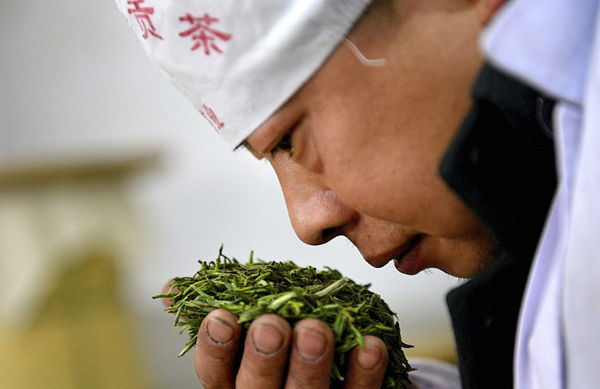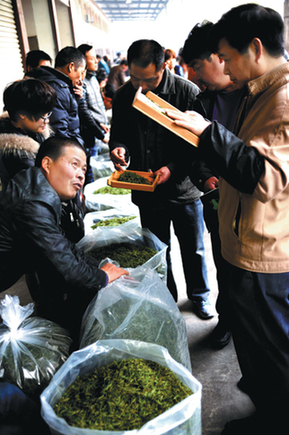Tea time loses its popularity
Updated: 2013-04-04 07:43
By Wu Yiyao (China Daily)
|
|||||||||
 |
|
A tea roasting technician judges the fragrance of tea leaves. Ou Dongqu / Xinhua |
The nationwide campaigns against extravagance and corruption are the reasons there are less buyers this year. Traditionally a portion of the production was reserved for government officials, and as a highly prized commodity the tea was also used as a gift or bribe.
|
 |
|
A busy tea market trading mingqian tea in Songyang county, southwestern Zhejiang province. Liang Zhen / for China Daily |
Zhu said if a kilogram of tea is sold to wholesalers for 8,000 yuan and then sold on to retailers for around 10,000 yuan per kilogram, these are reasonable prices.
"People work hard and get paid. But the high prices reported in newspapers and TV programs are not the real incomes of the farmers or dealers. What's the reason for the 120,000 yuan per kilogram the tea fetches at auction?"
In olden days mingqian tea was considered to be worth its weight in gold.
"It's a limited treasure," said Weng Qianmei. "There are 365 days in a year, but only 15 of them produce mingqian tea."
The high esteem of mingqian tea can be traced back to the days when the Day of Pure Brightness, the 104th day after the Winter Solstice, was the day the emperors received tributes from across the nation. Although voluntary at first, in the Tang Dynasty (AD 618-907) officials were dispatched to supervise the collection of tea, and the tea farmers had to rush the tea from the tea growing areas around Hangzhou to the capital Chang'an, modern day Xi'an, within 10 days to make sure the tea arrived on time.
This year, due to the warmer weather, production of mingqian tea began about two weeks earlier than usual. Some tea farmers started picking the leaves as early as March 10, instead of the traditional March 25, which means that the production period for ming-qian tea may be longer than usual.
"We can't wait, otherwise the fragrance of the tea leaves will disappear. The leaves grow too fat, and all the delicacy of the jade-like leaves fades away," said Ma Qingfang, a 46-year-old tea picker.
Picking the tea is hard work, the pickers have to nip off the leaves with their nails, and on days when the weather is favorable, dry but not too hot, they may be picking the leaves from early morning to the afternoon.
"It is exhausting and it requires sharp eyes to identify the leaves which are tender and mature enough to be picked," said Li Jinfang, a 35-year-old tea picker from neighboring Anhui province, who expects to earn about 2,000 yuan picking the tea this year.
Li said some years her employer gave the pickers a small pack of tea to try, so they can taste the difference. "But I think it would be better if I got the money instead of the tea - perhaps I could make another two or three hundred yuan," said Li.

 Li Na on Time cover, makes influential 100 list
Li Na on Time cover, makes influential 100 list
 FBI releases photos of 2 Boston bombings suspects
FBI releases photos of 2 Boston bombings suspects
 World's wackiest hairstyles
World's wackiest hairstyles
 Sandstorms strike Northwest China
Sandstorms strike Northwest China
 Never-seen photos of Madonna on display
Never-seen photos of Madonna on display
 H7N9 outbreak linked to waterfowl migration
H7N9 outbreak linked to waterfowl migration
 Dozens feared dead in Texas plant blast
Dozens feared dead in Texas plant blast
 Venezuelan court rules out manual votes counting
Venezuelan court rules out manual votes counting
Most Viewed
Editor's Picks

|

|

|

|

|

|
Today's Top News
Boston bombing suspect reported cornered on boat
7.0-magnitude quake hits Sichuan
Cross-talk artist helps to spread the word
'Green' awareness levels drop in Beijing
Palace Museum spruces up
First couple on Time's list of most influential
H7N9 flu transmission studied
Trading channels 'need to broaden'
US Weekly

|

|








